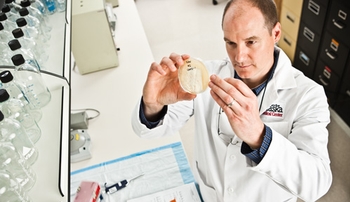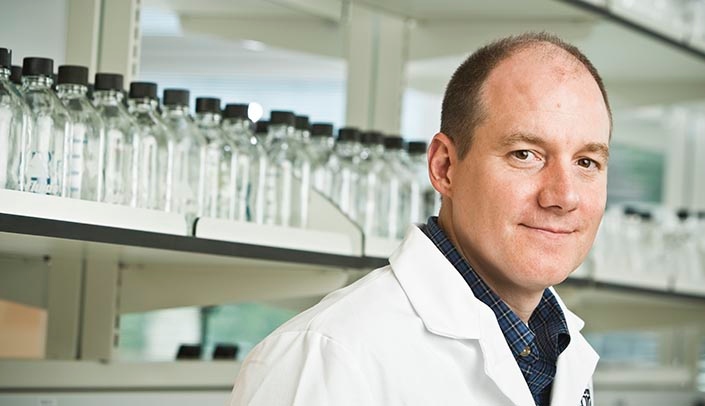Through the creation of a library of more than 2,000 mutant strains of the Staphylococcus aureus bacteria, UNMC has provided an important tool for scientists around the world seeking answers for how to better deal with staph infections.
 |
| The UNMC Center for Staphylococcal Research is the only one of its kind in the U.S. |
The project – detailed in the Feb. 12 issue of mBio, the journal of the American Society for Microbiology – was spearheaded by Paul Fey, Ph.D., first author, and Ken Bayles, Ph.D., senior author.
Dr. Fey is professor, pathology and microbiology, and medical director of clinical microbiology. Dr. Bayles is associate vice chancellor for basic science research and director of the UNMC Center for Staphylococcal Research.
Library of mutant staph bacteria is beneficial
Developed over the past four years, the library of mutant staph bacteria allows scientists to better understand how staph genes cause infections. It also helps pharmaceutical companies develop new drugs to combat staph infections.
The mutant strains have been deposited in the Network on Antimicrobial Resistant Staphylococcus Aureus (NARSA), a repository funded by the National Institutes of Health. There is no cost for scientists to acquire these mutant strains.
Library used far and wide
NARSA already has provided nearly 2,600 mutant strains to scientists from 85 different laboratories and 12 countries. The entire library has been sent to 20 different labs around the world including labs in Germany, Switzerland, China, Ireland and England.
"Based on the high usage, it's clearly making a difference to the scientific community," Dr. Fey said. "This was a significant undertaking, so it's rewarding to see that other investigators appreciate what we have done."
Dr. Fey said it often takes several months for scientists to develop a single mutant strain. "Having access to the library of mutant strains saves them a lot of time and work, and it allows for rapid hypothesis generation for their research," he said.
Genetic tools developed to complement the library
To complement the library of mutant strains, Jeffrey Bose, Ph.D., a fellow in pathology and microbiology, created a variety of genetic tools to help investigators better utilize the library. His work will be featured next month in Applied and Environmental Microbiology. The project was funded by a $1.9 million earmark that former Nebraska Sen. Ben Nelson was able to procure from the U.S. Department of Defense in 2009.
